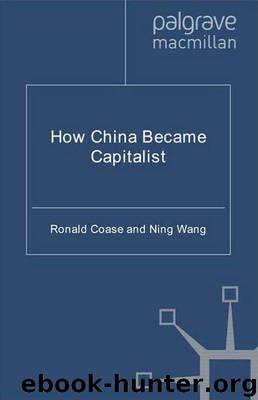How China Became Capitalist (International Economic Association) by Coase Ronald & Wang Ning

Author:Coase, Ronald & Wang, Ning [Wang, Ning]
Language: eng
Format: epub
Publisher: Palgrave Macmillan - A
Published: 2012-03-19T16:00:00+00:00
6
From Capitalism to Capitalisms
In the concluding speech at the close of the 2008 Chicago Conference on China’s Market Transformation on July 18th, 2008, Ronald Coase pronounced that “the struggle of China is the struggle for the world.”1 On December 10th, 2008, Time magazine published a commentary on China’s three decades of market transformation and the heroic role played by Deng Xiaoping in this remarkable human drama. The article ended by stating “That is the great story of our time. It is our story, everyone’s story – not just China’s.”2
When this narrative opened its first chapter after Mao died in 1976, the post-Mao Chinese government made a determined shift in strategy in the aftermath of the Cultural Revolution, giving up class conflict and embracing socialist modernization as an alternative approach to realizing the “superiority of socialism.” The ideological radicalism that had persisted since the mid-1950s was at last recognized as flawed and harmful, and this opened up room for common sense and pragmatism in policymaking. This shift in leadership and policy loosened the grip of socialist ideology and precipitated the ensuing Chinese economic reform. During Mao’s era, waves of political campaigns to impose the dictates of socialism had failed to take China to the promised land of shared prosperity. Dismay and discontent were widespread and deeply felt, especially amongst Party veterans who had lost positions during Mao’s era, intellectuals who had been attacked as “rightists,” and the majority of the 800 million Chinese peasants who had been struggling to make ends meet ever since agricultural collectivization. They desperately wanted change.
Rejecting class struggle and embracing socialist modernization, China finally broke the spell of a negative sum game of political infighting and started a positive sum game of economic development. Their bitter disappointment with Mao’s grandiose but disastrous socialist experiment had clearly taught the Chinese to be skeptical of any grand blueprint for reform. At the same time, having long been isolated from the outside world, the Chinese were hardly aware of any alternatives to socialism. This left their leaders with no choice but to work with whatever they could find, through improvisation and tinkering. Still rallied under the ideological banner of socialism, they tried out different ways of achieving its practical ends. However, by the end of the twentieth century, instead of celebrating itself as a “great, modern, socialist power” resting on public ownership and state planning, as intended in the 1978 Communiqué,3 China found itself with a vibrant economy awash with private entrepreneurship and market forces. This is the most unexpected aspect of the Chinese economic transformation. China became capitalist while it was trying to modernize socialism. The story of China is the quintessence of what Adam Ferguson called “the products of human action but not human design.”4 A Chinese proverb puts it more poetically: “flowers planted on purpose do not blossom; the willows no one cared for have grown into big trees offering ample shade.”
I
China’s economic reform, as conceived at the beginning and thought of throughout its progress, was never intended to dismantle socialism and move to capitalism.
Download
This site does not store any files on its server. We only index and link to content provided by other sites. Please contact the content providers to delete copyright contents if any and email us, we'll remove relevant links or contents immediately.
International Integration of the Brazilian Economy by Elias C. Grivoyannis(111059)
The Radium Girls by Kate Moore(12028)
Turbulence by E. J. Noyes(8049)
Nudge - Improving Decisions about Health, Wealth, and Happiness by Thaler Sunstein(7706)
The Black Swan by Nassim Nicholas Taleb(7129)
Rich Dad Poor Dad by Robert T. Kiyosaki(6632)
Pioneering Portfolio Management by David F. Swensen(6300)
Man-made Catastrophes and Risk Information Concealment by Dmitry Chernov & Didier Sornette(6019)
Zero to One by Peter Thiel(5801)
Secrecy World by Jake Bernstein(4753)
Millionaire: The Philanderer, Gambler, and Duelist Who Invented Modern Finance by Janet Gleeson(4478)
The Age of Surveillance Capitalism by Shoshana Zuboff(4292)
Skin in the Game by Nassim Nicholas Taleb(4248)
The Money Culture by Michael Lewis(4207)
Bullshit Jobs by David Graeber(4190)
Skin in the Game: Hidden Asymmetries in Daily Life by Nassim Nicholas Taleb(4006)
The Dhandho Investor by Mohnish Pabrai(3764)
The Wisdom of Finance by Mihir Desai(3746)
Blockchain Basics by Daniel Drescher(3582)
